Virtual Environments
-
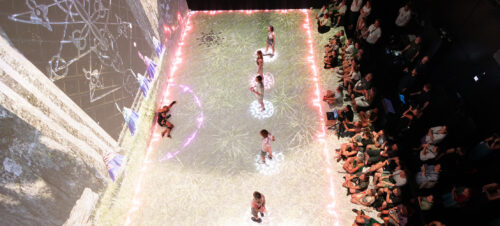
SHARESPACE
Exploring Social Spaces with Avatars
How could humans use digital avatars in the near future? How can we engage in social situations that include both human and automated avatars? And what technology do we need to explore these ‘hybrid’ spaces together? This is the focus of the European R&D project SHARESPACE.
-
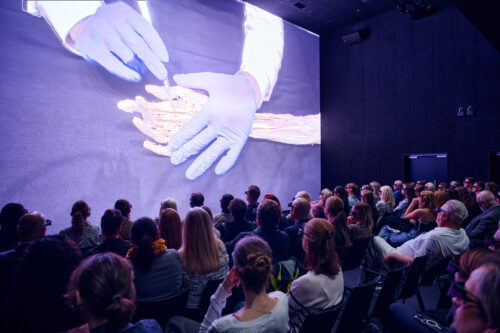
Virtual 3D Anatomy Lecture Hall
World first for medical teaching
A novel virtual 3D lecture hall connects the Austrian medical universities in Linz and Graz: students can follow lectures on Virtual Anatomy and dissection work in stereoscopic 3D, live and in real-time, from over 200 kilometers away.
-
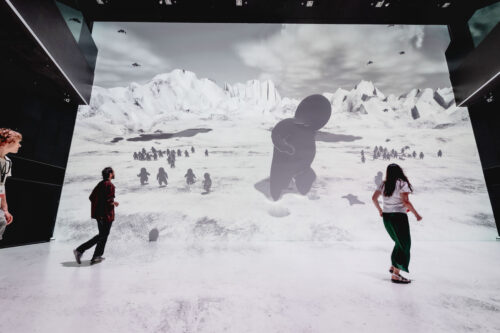
Converge
Collaboration via Avatars and Movement
Converge is an interactive work for Deep Space 8K by the Ars Electronica Futurelab, based on SHARESPACE, a large European R&D project on using avatars in social situations. In Converge, up to ten participants on site and one external person in a motion capture suit are tracked – they have to communicate through movement and…
-
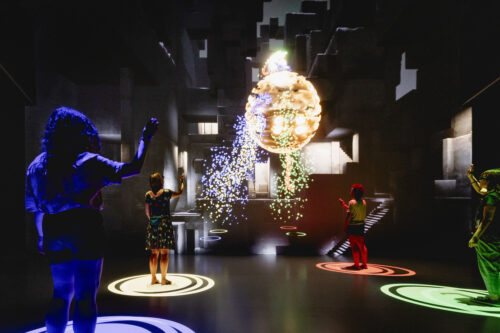
*falcon heavy
Audiovisual multi-user artwork
*falcon heavy is a multi-user experience and stereoscopic audiovisual sculpture for Deep Space 8K, generated in real-time. An ever-shifting entity rules the ritualistic semi-virtual arena; populated by people participating together to find synchronous signals in all the noise.
-
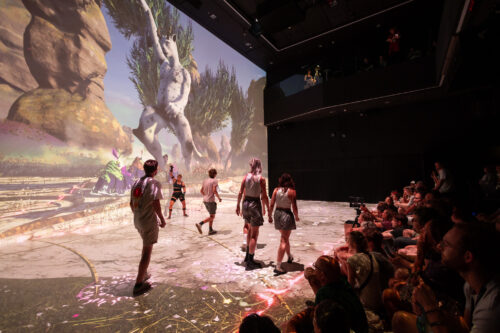
State of Play:شهر بازی
Anti-Colonial, Participative Art Performance
State of Play:شهر بازی by artists Tara Habibzadeh, Harriet Davey, and Mati Bratkowski, is a game-based participative art performance referencing the 7 Labors of Rostam in the long epic poem Shahnameh by Abul-Qâsem Ferdowsi Tusi (Iran, 977–1010 CE). In it, up to 5 audience members reenact the final labour, controlling their avatars of Rostam in…
-

Faust VR
Virtual Dive into Theater History
The virtual reality application Faust VR combines a digital recreation of the famous “Faust” production by Max Reinhardt from the 1930s with a specially created dramaturgy: It leads visitors through the formative elements of the play in the unique “Faust town”.
-
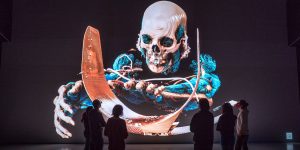
Deep Space 8K EVOLUTION
Ars Electronica’s Most Exciting Experience Space
Three visually stunning dimensions, over 50 million pixels of resolution, and a high-performance tracking system make Ars Electronica’s Deep Space 8K one of the world’s most exciting digital experience spaces – developed, built, and continuously maintained by the Ars Electronica Futurelab.
-

Welcome to Planet B
Playable Climate Futures in Deep Space 8K
E-vehicle or public transport? Nuclear power or renewable energy? Lab meat or vegan diet? The climate crisis challenges us with questions to which there are no easy answers. Important decisions await, and every action we take today has implications far into the future. Wouldn’t it be helpful to test our choices in virtual reality to…
-

Sounding Letters
Visualized Human/AI Piano Performance
A captivating virtual experience: the program Sounding Letters at Deep Space 8K shows how humans and AI create music together with a 3D piano concert.
-
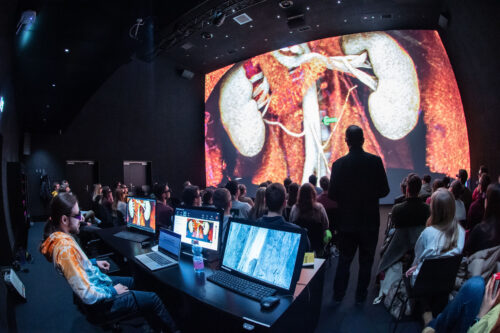
JKU medSPACE
Pioneering Venue for Anatomy Lectures
The JKU medSPACE is a completely new, worldwide unique venue for teaching anatomy, located at the Johannes Kepler University in Linz. Developed and implemented by the Ars Electronica Futurelab, the JKU medSPACE shows anatomy like never before, in quadruple stereoscopic 3D 8K projection at 14×7 meters: Lecturers and students dive into larger than life, photorealistic…
-

Virtual Crib
Historic Nativity Scene in Virtual Reality
More than a hundred years after its first exhibition, the nativity scene of the New Cathedral (Mariendom) in Linz was carefully restored. A team from the Ars Electronica Futurelab then scanned the figurines and landscapes using photogrammetry to create an audiovisual VR experience in stereoscopic 3D with a 360-degree perspective.
-

Schaunberger Grabmal
Cultural Heritage in High-Resolution 3D
To carefully translate one of the Schaunberger Grabmal (Schaunberger tombs) from the Collegiate Church in Wilhering into a virtual object, the contactless process of photogrammetry was employed. This turned the tomb into an immersive 3D cultural experience in Deep Space 8K.